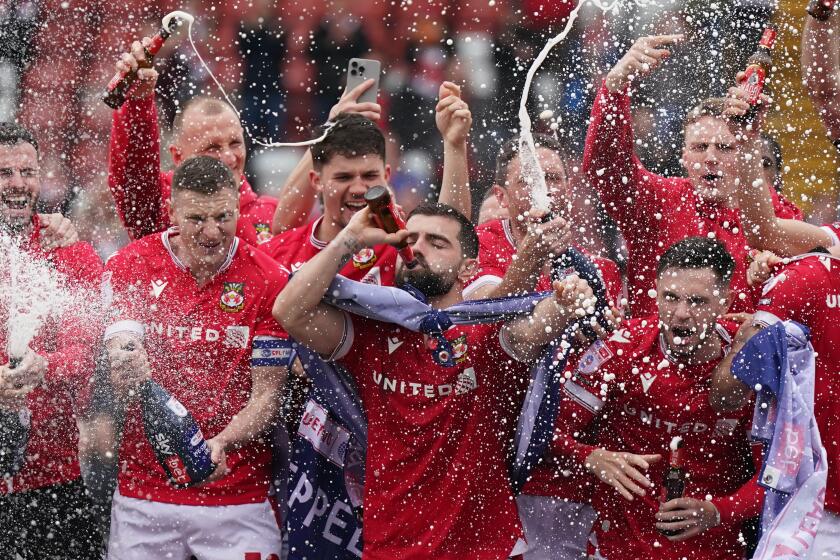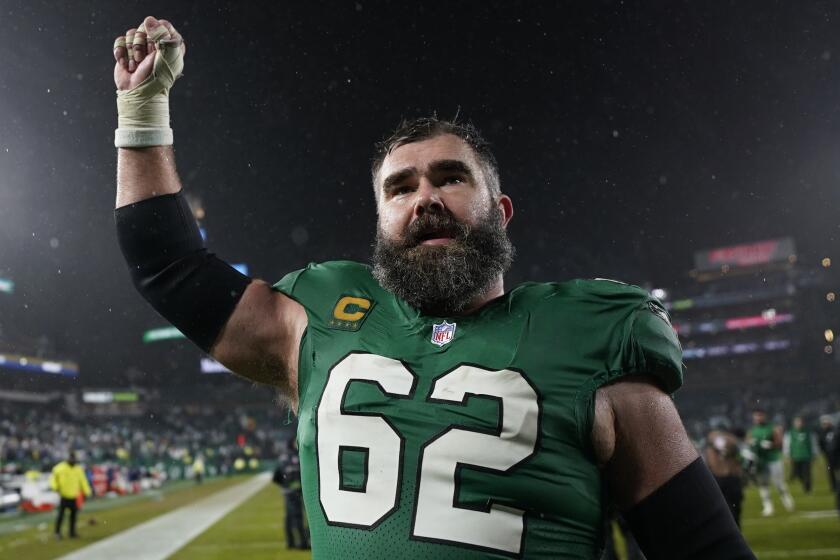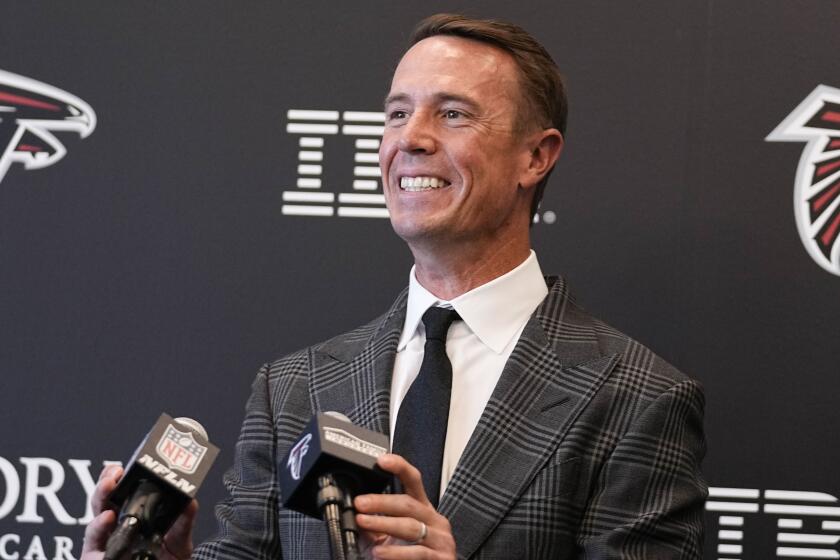For ‘Greenlight,’ Nothing Succeeds Like Failure
One of the great cottage industries of Hollywood is the endless number of workshops, classes and seminars that promise untold riches and fame to a multitude of wide-eyed wannabe writers and filmmakers. You’ve seen all the preposterous come-ons: “How to Be a Hot Screenwriter in 60 Days!” “How to Sell Your Script to Top Hollywood Agents!” “How to Pitch a Movie No Studio Exec Can Resist!”
Of course nobody teaches a class in “How to Mess Up Your First Movie and Do It With Every Rookie Mistake Being Immortalized by a Take-No-Prisoners Documentary Crew Eager to Make You Look as Inept as Possible on Nationwide Television.” Who would pay good money for that?
As it turns out, people everywhere, both inside and outside Hollywood, have been getting their kicks following that class every Sunday at 9:30 p.m. on HBO. It’s a 12-part “reality TV” series called “Project Greenlight” that documents the travails of neophyte writer-director Pete Jones, an apple-cheeked former insurance salesman from Chicago whose script about a friendship between two schoolboys won a filmmaking competition created by Matt Damon and Ben Affleck’s production company. Jones’ reward is the ultimate American Dream, circa 2002: getting $1 million to turn his script, “Stolen Summer,” into a movie that will be distributed nationwide by Miramax in March.
Full of ego battles, weaselly back-stabbing and boneheaded movie-making--imagine a cross between “Survivor” and “Day for Night,” if it had been directed by Joe Eszterhas--the series is irresistibly watchable because, like a great tell-all book, it slips behind the iron curtain of the Hollywood publicity machinery. Those in the industry have openly questioned the series’ “reality,” it being hard to believe that anyone would surround a first-time director with such an inexperienced crew.
But HBO original programming chief Chris Albrecht says the series has “exceeded our expectations in every way. I’ve got friends who have nothing to do with show business who are totally caught up in it, calling me and saying, ‘Geez, I hate that Miramax guy’ or ‘I can’t believe what a mess Pete Jones got into last week.’ The audience has really got involved with the characters.”
With ratings up since HBO moved the series to its post-”Sex and the City” time slot, the network has informally agreed to air a “Greenlight” sequel that will film this summer.
The documentary, filmed by a team headed by Liz Bronstein, doesn’t skimp when it comes to wickedly entertaining examples of near-total disaster. As New York Times critic Caryn James put it when the series debuted in November: “You’ve never had so much fun watching someone else fail.”
And oh boy, how they do fail! The first day of shooting finds Jones underneath Chicago El tracks, trying to film a lengthy dialogue scene with two 10-year-old boys, only to have the scene repeatedly drowned out by passing trains. It turns out no one thought to bring the soundman along when they scouted the location. Jones is the hapless hero, indecisive one moment, digging in his heels the next. When forced to compromise in the face of budget limitations, he snaps, “Over my dead body!” so many times that one of his producers finally advises him to “come up with a new phrase.”
As a bracing illustration of realpolitik filmmaking, the series is required viewing, offering all sorts of practical lessons you won’t learn in those how-to-break-into-Hollywood seminars. Lesson No. 1: Actors have all the power in Hollywood. When the producers realize they need more money for the film, they are stymied at every turn by cost-conscious Miramax execs. But Affleck picks up the phone and instantly gets Harvey Weinstein to agree to a meeting. (Weinstein is the only person smart enough--or powerful enough--to duck the cameras. Asked why he was so camera-shy, he told me: “I thought it was the cool thing to do to be the man of mystery, like in ‘Charlie’s Angels.’”)
Even Aidan Quinn, who’s hardly an A-list star, has plenty of clout. The only reason the filmmakers get a 25-day shoot--five more days than initially budgeted--is because Quinn made it a prerequisite of his agreeing to do the film, believing the rookie director would need all the extra days he could get. For himself, Quinn got a dialogue coach, approval on the casting of the female lead and back-end money. (Don’t hold your breath on that one, pal!)
The differences between Quinn and Matt & Ben are striking: Damon and Affleck are breezy and irreverent, smoking cigarettes and drinking Samuel Adams beer, a nice plug for the series sponsor. Quinn is wary and demanding--he’s clearly a guy who’s always had to fight for whatever he got. Young writer-directors, take note: Always make sure you can explain anything--and I mean anything--in the script to your Method-obsessed actors. Exploring the firefighter he plays in the ‘70s-era film, Quinn at one point asks Jones, “In your mind, was this character in Vietnam?”
Lesson No. 2: If you’re shooting outdoors and it looks like rain, make sure you have a backup set. Somehow the bumbling producers get stuck without one and spend a day shooting a Little League game in monsoon-like conditions. As the baseball field dissolves into mud, everyone huddles under ponchos except Quinn, who decides his blue-collar character wouldn’t use an umbrella.
*
The series’ success reaffirms our continuing fascination with Hollywood ineptness and failure, a formula that has also helped books like Steven Bach’s “Final Cut” and Kim Masters and Nancy Griffin’s “Hit and Run” become bestsellers. But people who work in the industry, perhaps worried that viewers will think them all dolts, question whether the filmmakers’ blunders are truly natural disasters or manipulated for the benefit of the TV cameras.
Did Miramax and the “Greenlight” team put the fix in when they decided to pick a script that saddled a rookie director with a triple whammy: a period film, shot on location with kids who can work only five hours a day and surrounded by a largely inexperienced crew.
As one line producer I know put it: “If you have a first-time director, you surround him with experienced people, not weak, untested producers and a cinematographer who’s never shot a studio film.” Another fan of the show, Liz Dubelman, an Emmy Award-winning director and producer-turned- media consultant, says, “For me, the El scene was a pivotal moment. You didn’t need a soundman to figure out you can’t shoot a conversation under an El track. It’s when I started not to believe that the documentary cameras weren’t affecting everything.”
Although Quinn was at the Sundance Film Festival, helping promote “Stolen Summer,” the actor was so incensed when he saw how he was portrayed in the series that he recently wrote a three-page letter to Miramax TV and the “Greenlight” team contending that most of his scenes were taken out of context, making him appear arrogant and controlling.
In fairness, nearly everyone comes off pretty badly. That includes the Miramax TV execs who, at a time when Weinstein is scrambling to position his company as returning to its art-house roots, choose an accessible script over a more ambitious art-house screenplay, saying Jones’ script is “a more open story people all over the country will appreciate.” Even Chris Moore, who is the film’s chief producer and Matt & Ben’s “Greenlight” partner, looks like a heel. He blows up at everybody so often in the series that he acknowledges that “everyone watching thinks I’m the ass. Newsweek called me the ‘crafty heavy.’”
Moore says nothing was staged for the cameras. But he admits there were instances--specifically a key meeting between Jones and one of his producers--when the participants were allowed to confer without the presence of cameras. The series’ demands for juicy drama put Moore in a difficult bind. As the one battle-tested producer on the film, Moore could’ve stepped in and fixed a lot of the on-set problems.
But a smooth-running movie would’ve made a dull documentary. So Moore is constantly seen letting everyone make mistakes--and then loudly berating them afterward. During one critical juncture, when all hell is breaking loose, he wanders off to a nearby playground to shoot hoops.
“The one person Matt and Ben asked ahead of time not to solve all the problems was me,” says Moore, who worked with the pair on “Good Will Hunting.” “We had a crucial conversation before we pitched the show where we essentially decided that I wouldn’t step in and help or call in favors and bring in a more experienced crew. Believe me, it was killing me not to put my foot down and say, ‘Hey, you guys are being unbelievable morons!’” (Moore has become such an outsized character that the series is now sponsoring a video contest for the best impression of the volcanic producer.)
Moore says the prospect of having documentary cameras on hand made it difficult to attract actors and crew for the shoot. “There were definitely people who didn’t audition or meet with the director because they wouldn’t sign releases [for the documentary].” He says it was also “a nightmare” persuading Miramax execs to appear on camera. “But we told them that if Matt and Ben were going to be on camera, then they had to do it too.” Of course all this attention hasn’t hurt Miramax; the company made a profit just from selling the series to HBO.
As a TV viewer, I have no quarrel with the series’ nod ‘n’ wink approach to reality, which seems far less staged than the “reality” on display on shows like “Survivor.” But I bet it’ll be a lot harder to get experienced people on camera for a “Greenlight” sequel, even if Miramax is willing to promise another $1-million budget and guarantee a theatrical release. It turns out that making movies is a lot like making sausages; it can get pretty ugly inside the kitchen.
*
“The Big Picture” runs every Tuesday in Calendar. If you have questions, ideas or criticism, e-mail them to patrick.goldstein@latimes .com
The complete guide to home viewing
Get Screen Gab for everything about the TV shows and streaming movies everyone’s talking about.
You may occasionally receive promotional content from the Los Angeles Times.



